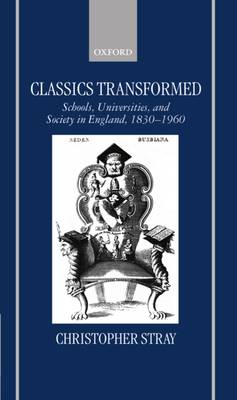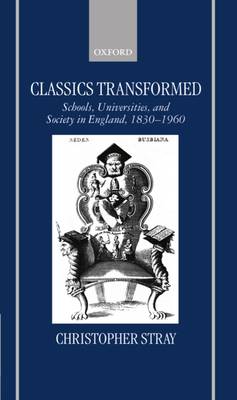
- Afhalen na 1 uur in een winkel met voorraad
- Gratis thuislevering in België vanaf € 30
- Ruim aanbod met 7 miljoen producten
- Afhalen na 1 uur in een winkel met voorraad
- Gratis thuislevering in België vanaf € 30
- Ruim aanbod met 7 miljoen producten
Zoeken
Classics Transformed
Schools, Universities, and Society in England, 1830-1960
Christopher Stray
Hardcover | Engels
€ 339,95
+ 679 punten
Omschrijving
This is the first book to give a general account of the transformation of classics in English schools and universities from being the amateur knowledge of the Victorian gentleman to that of the professional scholar, or from an elite social marker to a marginalized academic subject. The challenges to the authority of classics in 19th-century England are analyzed, as are the many and various ideological responses of its practitioners. The impact of university reform on the content and organization of classical knowledge is described in detail, with special reference to Cambridge. Chapters are devoted to the effects of state intervention, social snobbery, and democracy on the provision of classics in schools, and the dissensions within the bodies set up to defend it. The narrative runs clear up to the present, fully covering along the way the abolition of Compulsory Latin in 1960 and the absence of classics from the National Curriculum in 1988.
Specificaties
Betrokkenen
- Auteur(s):
- Uitgeverij:
Inhoud
- Aantal bladzijden:
- 352
- Taal:
- Engels
Eigenschappen
- Productcode (EAN):
- 9780198150138
- Verschijningsdatum:
- 14/05/1998
- Uitvoering:
- Hardcover
- Formaat:
- Genaaid
- Afmetingen:
- 218 mm x 145 mm
- Gewicht:
- 569 g

Alleen bij Standaard Boekhandel
+ 679 punten op je klantenkaart van Standaard Boekhandel
Beoordelingen
We publiceren alleen reviews die voldoen aan de voorwaarden voor reviews. Bekijk onze voorwaarden voor reviews.











